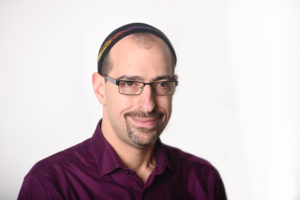Commentary on Parshat Shmini (Leviticus 9:1 – 11:47)
What happens when the gift we want to offer isn’t accepted?
Why do our efforts to be holy sometimes have tragic consequences?
Our Torah reading celebrates the completion of the Mishkan, the Tabernacle built to be God’s dwelling place amongst the people. Precise instructions have been followed, sacrifices are offered, blessings invoked, and the Presence of God appears to the entire Israelite community. Fire comes from God and consumes the sacrifices, and the people are awestruck, and fall on their faces. What could be more awesome and holy than knowing that God approves of your offerings and has arrived to live with you?
The moment of holiness turns tragic when Aaron’s sons Nadav and Avihu take their own fire pans and offer a strange fire. What were they thinking? What more could they have wanted from this communal moment of Divine connection? The Torah doesn’t tell us. All we know is that a second fire blazes out of God’s presence, and when the moment passes, Nadav and Avihu are dead, the strange fire of their offering quenched by the fire of God.
Sign up to receive Torah from T’ruah in your inbox each week.
Why did they have to die? Biblical commentators disagree. They were showing off in front of their father and Moses. They were told not to make an offering, and they did it anyway. They took the people’s focus away from God. They used improper incense. They were drunk.
I can’t imagine God punishing them for offering an extra sacrifice. Even if they may have ruined the moment, surely offering an extra present to God doesn’t merit the death penalty. I can imagine that they were so excited by God coming to town that they got wrapped up in the ecstasy of what they thought would happen. Or maybe they worried that if God came down, the people would lose respect for the priests and take them for granted. Or maybe they were overwhelmed with the thought that now that the Mishkan was finished, their job every single day for years to come would be to handle intestines, blood, fat, and carcasses? Is that really our lot for the interminable future? Isn’t there anything else we can do? No? Well, maybe we can cheer ourselves up with a little of the leftover Kiddush wine…we’ll show God what we can do. We should be offering the sacrifices, not just dissecting them. Dad’s done this long enough; we’re just as good as he is; it’s our turn! Have another sip, my brother, and let’s do this…
Addiction is a strange fire in our midst. How often do we try to fill the emptiness inside by reaching for a drink, the remote, sex, drugs, cigarettes, pornography, food, cell phones, money and other forms of distraction? Unfortunately, none of these solutions can fill the void inside; they can only distract us for a while. Too often, they lead us down paths we never wanted to go, with progressively more challenging, and too-often fatal, consequences.
Find more commentaries on Parshat Shmini.
According to the Centers for Disease Control, on average, overdoses now kill 174 Americans per day. Nearly a third of all hospital visits are linked to addiction, and almost half of all emergency room visits for trauma or injury are linked to alcohol. In 2010, 85 percent of the U.S. prison population were incarcerated for substance-related reasons, and more than half of all jail inmates are diagnosed with substance use disorders. The rising costs of addiction exceed $700 billion annually. (All figures from shatterproof.org, a national nonprofit organization dedicated to ending the devastation addiction causes families.)
Like Nadav and Avihu, attempts to dull the pain of our problems can only backfire and will eventually consume us. A deeper connection with God and with community can bring us out from the darkness of addiction and into the light of recovery. We must be willing to feel our feelings, to become honest with ourselves about ourselves, and to ask for help from God, our loved ones, and our community.
Strange fires come and go. Healthy impulses and emotions can help us thrive in the world, yet unhealthy ones, left unchecked, will burn us up, sometimes slowly, sometimes quickly. The Jewish community is not immune to the challenges of addiction, and it is long past time we had more resources to offer those who struggle in our midst. Together, we can provide hope to all who still suffer, and community, healing, guidance and love to all of our people, one day at a time. 
Rabbi Ilan Glazer is the founder of Our Jewish Recovery, author of the new book “And God Created Recovery: Jewish Wisdom to Help You Break Free From Your Addiction, Heal Your Wounds, and Unleash Your Inner Freedom,” and host of the Torah of Life podcast.

